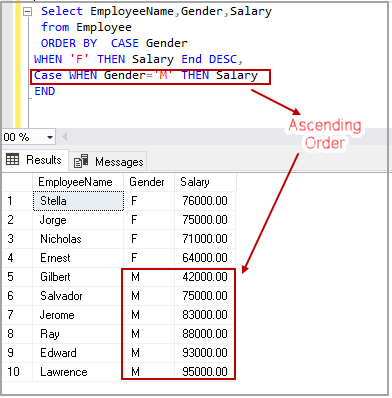
You can use below example of case when with multiple conditions. SQL CASE statement for if. Combining multiple condition in single case.
Evaluates a list of conditions and returns one of multiple possible result expressions. The CASE expression has two formats: The simple CASE expression compares an expression to a set of simple expressions to determine the result. Multiple conditions with CASE statements. The problem is, this CASE statement only returns TRUE if one of the first WHEN conditions is met. Stack Overflow for Teams is a private, secure spot for you and your coworkers to find and share information.
Ask Question Asked years,. Browse other questions tagged sql oracle case or ask your own question. Your first problem is that there is no CASE statement in SQL.

This is a declarative language and we have a CASE expression. Expressions return scalar values. The CASE works by first finding the data type of the THEN and ELSE clause to use for the result.
CASE can include multiple conditions and be used with aggregate functions. What is case in Oracle SQL? How to use case in SQL? Also you should be bale to use if exists, not exists to your conditions which are more optimized for performance. Now am struggling to convert it sql case.
The most efficient way to write this query is without joins at all. The key is that the CASE expression is only ever going to return (or 30) unique values if it finds a match. You can save off the into local variables and just use. CondVal ELSE END as Value There are two types of CASE statement, SIMPLE and SEARCHED. You cannot evaluate multiple expressions in a Simple case expression, which is what you were attempting to do.
The CASE statement chooses from a sequence of conditions , and executes a corresponding statement. SeeSQL-procedure- statement. Specifies a condition that is true, false, or unknown about a row or group of table data. So, once a condition is true, it will stop reading and return the result. If no conditions are true, it returns the value in the ELSE clause.
In a simple case statement, it evaluates conditions one by one. Once the condition and expression are matche it returns the expression mentioned in THEN clause. When combining these conditions , it is important to use parentheses so that the database knows what order to evaluate each condition. This example uses the WHERE clause to define multiple conditions , but instead of using the AND condition, it uses the OR condition. If it does go through the entire set of conditions , does that mean that the last condition evaluating to true overwrites what the first condition that evaluated to true did?
I am using Proc SLQ as supposed to sas datastep because I want to do group by and sum functions. I understand that datasteps can perform similar task but I want to use proc sql for this particular job. I need to achieve is to satisfy conditions before executing a select. Can i give multiple conditons in one statement ? It tests one expression against multiple values, this makes it great for transforming one set of values, such as abbreviations to their corresponding long form.
It is good when you wish to work with. A case construct has one output, a bit like a macro which generates text, if the text contains no semicolons then it can be invoked many times within a base SAS statement. END ) column_name When I run the query, the case statement seems to be evaluating only the first condition and ignores the send condition where the values. WHEN (column= awe and column= kls) THEN 2.
Geen opmerkingen:
Een reactie posten
Opmerking: Alleen leden van deze blog kunnen een reactie posten.